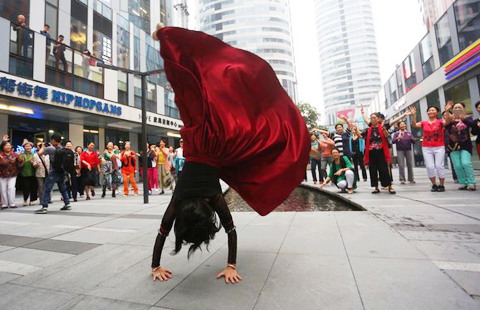Chinese mainland is Hong Kong's future: the Guardian
Updated: 2014-10-01 19:57
(chinadaily.com.cn)
|
|||||||||||
Most of the Occupy Central protesters in Hong Kong are driven by dislocation and resentment at Chinese mainlanders' success, according to an article published on the Guardian website.
It should be remembered that for 155 years until its handover to China in 1997, Hong Kong never enjoyed even a semblance of democracy under the British, wrote Martin Jacques, a columnist for the Guardian. All its 28 subsequent governors were appointed by the British government.
The idea of democracy was first introduced by the Chinese government, the article says. In 1990 Beijing adopted the Basic Law, which included the commitment that in 2017 the territory's chief executive would be elected by universal suffrage.
In the 17 years since the handover, Beijing has overwhelmingly honored its commitment to the principle of "One Country, two systems". The legal system remains based on English law, the rule of law prevails. The Chinese meant what they offered, according to the article.
Hong Kong - and its relationship with the mainland - was in fact changing rapidly. Herein lies a fundamental reason for the present unrest: the growing sense of dislocation among a section of Hong Kong's population.
During the 20 years or so prior to the handover, the territory enjoyed its golden era - not because of the British but because of the mainlanders, Jacques wrote.
Hong Kong was the beneficiary from Beijing's reform and opening-up policy - it became the entry point to the mainland, and as a result attracted scores of multinational companies and banks that wanted to gain access to the mainland market.
Much has changed since 1997. Hong Kong has lost its role as the gateway to the mainland. Previously Hong Kong was China's unrivalled financial centre, now it is increasingly dwarfed by Shanghai. Until recently, Hong Kong was by far China's largest port: now it has been surpassed by Shanghai and Shenzhen, and Guangzhou will shortly overtake it.
Two decades ago westerners comprised the bulk of Hong Kong's tourists, today mainlanders account for the overwhelming majority. Likewise, an increasing number of mainlanders have moved to the territory.
Many Hong Kong locals are struggling to come to terms with these new realities. They are experiencing a sense of displacement. They know their future is inextricably bound up with the mainland but that is very different from embracing the fact. Yet there is no alternative: Chinese mainland is the future of Hong Kong, Jacques concluded.
Related Stories
Traffic disrupted, schools shut as protest continues 2014-09-30 20:25
HK chief executive urges protest stoppage 2014-09-30 15:43
Protest disrupts life in Hong Kong, depresses stocks 2014-09-30 04:25
Illegal assembly in Hong Kong leads to clashes 2014-09-29 03:31
Hong Kong bars more than 3,500 mainland pregnant women 2014-09-24 16:14
Xi meets Hong Kong delegation 2014-09-22 21:42
Today's Top News
China to start direct yuan-euro trade
Protest disrupts life in Hong Kong
Slim waist fad causing problems
Americans split over role of gov't in their lives: Gallup
Spanish diplomat killed in Sudan
Independence of MH17 probe 'crucial'
Illegal assembly in Hong Kong leads to clashes
Aggrieved firms 'should go to court'
Hot Topics
Lunar probe , China growth forecasts, Emission rules get tougher, China seen through 'colored lens', International board,
Editor's Picks

|

|

|

|

|

|





